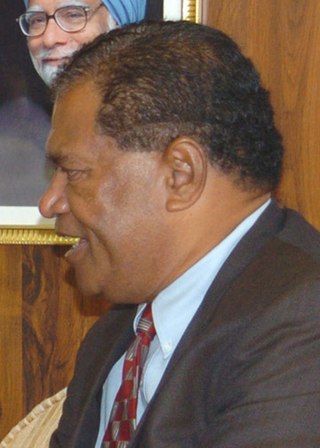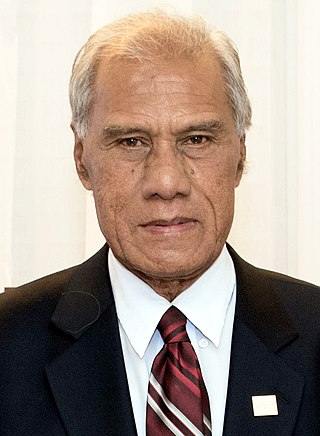Related Research Articles

Fiji, officially the Republic of Fiji, is an island country in Melanesia, part of Oceania in the South Pacific Ocean. It lies about 1,100 nautical miles north-northeast of New Zealand. Fiji consists of an archipelago of more than 330 islands—of which about 110 are permanently inhabited—and more than 500 islets, amounting to a total land area of about 18,300 square kilometres (7,100 sq mi). The most outlying island group is Ono-i-Lau. About 87% of the total population of 924,610 live on the two major islands, Viti Levu and Vanua Levu. About three-quarters of Fijians live on Viti Levu's coasts, either in the capital city of Suva, or in smaller urban centres such as Nadi or Lautoka. The interior of Viti Levu is sparsely inhabited because of its terrain.

Tupeni Lebaivalu Baba is a Fijian academic, politician, and former Cabinet Minister. A founding member of the Fiji Labour Party, he served as a Cabinet Minister in the government of Timoci Bavadra until removed from office by the 1987 Fijian coups d'état, and then as Deputy Prime Minister of Fiji in the government of Mahendra Chaudhry until removed from office by the 2000 Fijian coup d'état. After splitting with Choudhry in the wake of the coup, he founded the New Labour Unity Party to contest the 2001 election, but failed to win a seat in Parliament. He unsuccessfully attempting to re-enter politics at the 2006 election under the banner of the Soqosoqo Duavata ni Lewenivanua, and again at the 2014 election as part of the Social Democratic Liberal Party.

The chief justice is Fiji's highest judicial officer. The office and its responsibilities are set out in Chapter 5 of the 2013 Constitution of Fiji. The chief justice is appointed by the president on the advice of the prime minister.

Poseci Waqalevu Bune is a former Fijian civil servant, diplomat, politician and Cabinet Minister. He has served as chair of the Public Service Commissioner, secretary to the Prime Minister, and as Fiji's permanent representative to the United Nations, as well as a Cabinet Minister in the governments of Mahendra Chaudhry and Laisenia Qarase, and in the military regime of Frank Bainimarama.
Semesa Koroikilai Sikivou, CBE was a Fijian academic, politician, and diplomat.
Jioji Kotobalavu is a former Fijian civil servant who served as chief executive in the Prime Minister's office under five Prime Ministers. He now works as a lecturer at the University of Fiji.

Siaosi ʻAlipate Halakilangi Tau’alupeoko Vaea Tupou, more commonly known as Baron Vaea, was a Tongan politician who served as Prime Minister of Tonga. Vaea was a nephew of Queen Sālote, who ruled Tonga from 1918 until 1965, and a member of the Tongan nobility. His career in the Tongan government spanned 54 years.

Karam Chand Ramrakha was a former Fiji Indian lawyer, union leader and politician, who served in colonial Fiji's Legislative Council and independent Fiji's House of Representatives from 1966 to 1982.
Satendra Nandan is an Indo-Fijian academic, writer, and former politician. He is one of Fiji's leading writers.
Noor Dean is an Indo-Fijian lawyer and politician who served in the Suva City Council and was elected to the House of Representatives of Fiji in 1987.

Samiuela ʻAkilisi Pōhiva was a Tongan pro-democracy activist and politician. Pohiva, the leader of the Democratic Party of the Friendly Islands (DPFI), served as the Prime Minister of Tonga from 2014 to his death in 2019. He was only the fourth commoner to serve as Prime Minister, and the first commoner to be elected to that position by Parliament rather than appointed by the King.
Enetama Lipi is a former politician from Niue. He was an Assemblyman for Namukulu when he was elected into the Niue Legislative Assembly and was appointed to the Executive Council following the 1972 election. In 1973 he served as part of the negotiating team which negotiated the terms of Niue's self-government. He became a Cabinet Minister in Robert Rex's first Government following the attainment of self-government status by Niue on 19 October 1974.
Sione Lātūkefu was a Tongan academic and historian, and the author of several significant works on Tongan history.
Ratu Manoa Rasigatale is a Fijian historian, journalist, musician, television personality and former politician. He is a former member of the Senate of Fiji and represented Rewa.
The Chief Justice of the High Commissioner's Court, more commonly known as the Chief Judicial Commissioner for the Western Pacific, was the chief judicial officer throughout the British Western Pacific Territories from 1877 through 1976. This was a supra-colonial entity established by the Western Pacific Orders-in-Council 1877, and by the Pacific Order-in-Council 1893. Headed by a High Commissioner for the Western Pacific, who was also ex officio the Governor of Fiji, until the end of 1952, it included numerous islands, mostly small, throughout Oceania. Composition varied over time, but Fiji (1877–1952) and the Solomon Islands (1893–1976) were its most durable members.

The Chief Justice of Samoa is the chief justice of the Supreme Court of Samoa. The qualifications and powers of the office are governed by Part VI of the Constitution of Samoa and the Judicature Ordinance 1961. The position is currently held by Satiu Simativa Perese.

India–Tonga relations are the international relations that exist between India and Tonga. The High Commission of India in Suva, Fiji is concurrently accredited to Tonga.
"Isa Lei" is a traditional Fijian farewell song.
Paradise Beverages (Fiji) Limited is a Fijian alcoholic beverage producer based in Suva. It is a publicly listed company on the South Pacific Stock Exchange.
References
- ↑ The Far East and Australasia 1981-82. 1981. ISBN 9780905118666.
- 1 2 3 4 5 Karan, Maneesha (14 February 2007). "Sir Moti relives early days". Fiji Times. Archived from the original on 27 September 2007. Retrieved 2007-08-09.
- 1 2 "Fiji's Ombudsman". The Press. 3 March 1972. p. 8. Retrieved 25 April 2023– via Papers Past.
- ↑ "Personal Items". The Press. 9 April 1954. p. 10. Retrieved 25 April 2023– via Papers Past.
- ↑ "News of the Small-Ships". Pacific Islands Monthly. Vol. XXV, no. 7. 1 February 1955. p. 117. Retrieved 25 April 2023– via National Library of Australia.
- ↑ "Tongan M.P. Acquitted On Sedition Charge". The Press. 13 June 1957. p. 11. Retrieved 25 April 2023– via Papers Past.
- 1 2 "People". Pacific Islands Monthly. Vol. 40, no. 6. 1 June 1969. p. 105. Retrieved 25 April 2023– via National Library of Australia.
- ↑ "Behind Fiji's Prison Troubles". Pacific Islands Monthly. Vol. 36, no. 4. 1 April 1965. p. 59. Retrieved 25 April 2023– via National Library of Australia.
- ↑ "Judge lands in Suva". Canberra Times. 7 February 1972. p. 7. Retrieved 25 April 2023– via National Library of Australia.
- ↑ "Taking scissors to red tape". Pacific Islands Monthly. Vol. 43, no. 4. 1 April 1972. p. 43. Retrieved 25 April 2023– via National Library of Australia.
- ↑ "Rabuka appoints ombudsman". Canberra Times. 26 November 1987. p. 5. Retrieved 25 April 2023– via National Library of Australia.
- ↑ "International Commission of Jurists" . Retrieved 2007-08-09.
- ↑ SAKIASI NAWAIKAMA (16 July 2009). "A distinguished path". Fiji Times. Archived from the original on 17 July 2009. Retrieved 18 July 2009.
- ↑ "A True Son Of Fiji, Sir Moti Tikaram". Fiji Sun. 18 November 2014. Retrieved 25 April 2023.
- ↑ "Sir Moti Tikaram Memorial Lecture". University of Fiji. Retrieved 25 April 2023.
- ↑ "How it started". Archived from the original on 2007-09-27. Retrieved 2007-08-09.
- ↑ "No. 48046". The London Gazette (Supplement). 28 December 1979. p. 35.
- ↑ "Sir Moti honoured in India" . Retrieved 2009-01-31.
- ↑ "Retired Fiji Supreme Court Judge given a prestigious award in India". RNZ. 31 January 2009. Retrieved 25 April 2023.